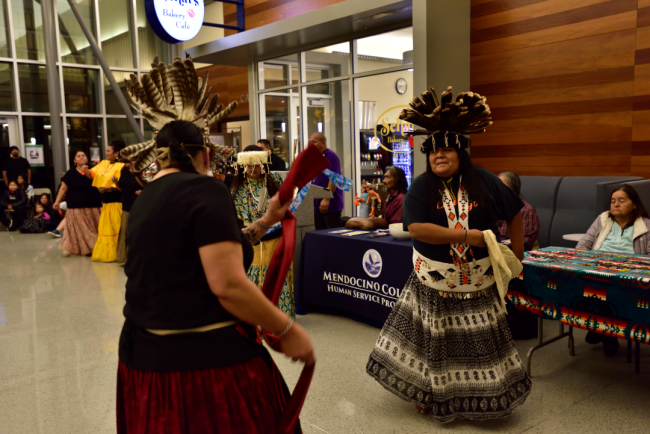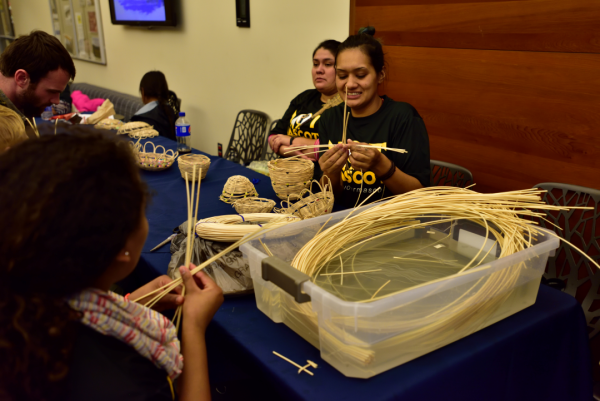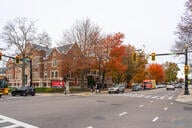You have /5 articles left.
Sign up for a free account or log in.

Two dancers from the Hopland Band of Pomo Indians perform at Mendocino College for Native American Day. Mendocino College is expanding its support services for Native American learners with additional grant funding from the California Community Colleges system.
Mendocino College
Supporting Native American student success is more than just an institutional goal at Mendocino College. It’s a mission to heal broken trust between Native communities and higher education.
The Ukiah, Calif., community college recently received $1.5 million in grant funding to expand programming for Native American learners, with goals of adding more staff and increasing outreach to the 15 tribal communities in the surrounding counties.
The soon-to-launch Native American Student Support and Success program adds to the institution’s decades-old commitment to equitably serve the local community and bridge gaps in completion.
“We have already a pretty strong legacy of serving Native American students in our college, so really we are just amplifying that work and expanding it,” says Mendocino College president and superintendent Tim Karas. “We want to do everything we can for everyone to see that higher education is in their future, and this is just one piece of that.”
Grant funding: Mendocino was one of 20 colleges that received grant funding from the chancellor of the California Community Colleges system. The system’s grant funding builds on a history of money allocated for identity groups, including Asian American and Pacific Islander students and Latino students, says Karas.
Mendocino, established 50 years ago, has the highest number of Native American students among the 116 colleges in California Community Colleges system, with 5.56 percent of its students identifying as Native American, as of spring 2023.
The college received the grant funding in June and is in the process of hiring two full-time staff members to support the program: a director and a retention specialist.
The director will support program development and liaise between tribal leaders and the university, and the retention specialist will be responsible for assisting Native American students in accessing resources related to persistence and identifying where there are gaps in support, Karas says.
Building on the past: The college’s focus on Native students is directly related to its location in Northwestern California.
“Being a small, rural-serving institution, we have to figure out ways to serve people all over our county,” Karas says. “We have to make our systems work for people who live in very small, remote areas that, in other contexts, would be too small in some ways.”
In the 1980s, Mendocino opened its Native American resource center and in 1986 held its first Native American Motivation Day, welcoming young Native students to campus to educate them on the college programs and meet representatives from local organizations and four-year institutions.
Over the years Mendocino has expanded its services for Native students, launching Pomo Pathways in 2018 to support learners with financial and academic supports and hosting monthly Native Learning Symposiums, funded by National Endowment for the Humanities grant money.
Creating community: With the launch of the new program, Karas hopes to bring the conversation to Native communities rather than looking to unite nations on campus. “This five-year grant is not going to get us to the finish line,” Karas admits. “I feel this grant is recognizing that, in our system, we need to put resources towards our Native communities and Indigenous communities, but it’s just the beginning.”
Native American groups in particular have faced generational trauma related to education, including in the K-12 setting, where for decades children were sent off to boarding schools to unlearn their culture and language, and many have been kept out of higher education.
As president, Karas plans to deepen relationship with Native leaders by visiting them regularly, as opposed to inviting them to campus. “We’re trying to … break down that barrier by just showing up, again and again and again, in different ways that are meaningful,” he says.

Mendocino community members can participate in weekly basket weaving every Wednesday in the library.
Mendocino College
Faculty and staff members are also involved in supporting Native American students through critical evaluation of course materials, hosting cultural events (like a weekly basket-weaving activity in the library) and increasing access to basic needs support for those who need it.
“It’s more than just getting students in the door—it’s really about changing the perception of education with our Native communities who have been underrepresented for too long,” Karas says.
If your student success program has a unique feature or twist, we’d like to know about it. Click here to submit.




